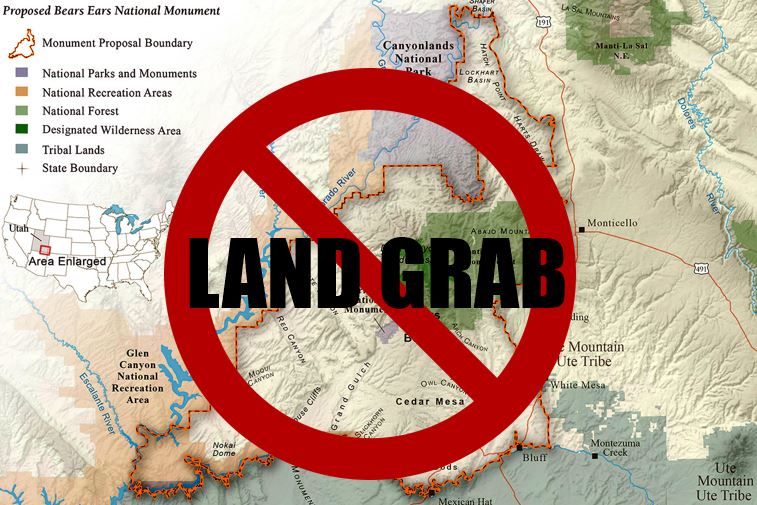The states examined in this study earn an average of $14.51 for every dollar spent on state trust land management. The U.S. Forest Service and Bureau of Land Management generate only 73 cents in return for every dollar spent on federal land management.
posted by Marjorie Haun
On September 6, the House Committee on Natural Resources held a hearing on three bills geared towards giving states greater control over energy development on federal lands within their boundaries. The Committee cited a 2015 study by the Property and Environment Research Center (PERC) which concluded state management of natural resources is dramatically more profitable, and yields significant financial benefits for state-funded programs such as public schools. The findings of the PERC study include:
•The federal government loses money managing valuable natural resources on federal lands, while states generate significant financial returns from state trust lands.
•The states examined in this study earn an average of $14.51 for every dollar spent on state trust land management. The U.S. Forest Service and Bureau of Land Management generate only 73 cents in return for every dollar spent on federal land management.
•On average, states generate more revenue per dollar spent than the federal government on a variety of land management activities, including timber, grazing, minerals, and recreation.
State School Trust Lands were originally set aside to fund public education within the given states, but federal control, and in some cases onerous state energy regulations, have prevented resource development on those lands, and as a result public schools in Western states have suffered. When those lands are opened up to energy development, public schools can receive millions in necessary funding that otherwise might not be available. A case in point is the recent disbursal of $64 million in revenue to Utah’s public schools. KSL reported:
Trust lands are parcels of land held in trust to benefit 12 state institutions, primarily public schools. When Utah became a state, Congress granted parcels of land to the state and created permanent endowments to support these institutions.
David Ure, director of the Utah School and Institutional Trust Lands Administration, manages the state’s 4.5 million acres of trust lands on behalf of the public education system and other institutions, and oversees uses of the land that include livestock grazing, timber harvesting, oil and natural gas extraction, mining, land sales and land development.
Increasing the ability of states to fund public education is a major goal of Representative Liz Cheney’s ‘State Mineral Revenue Protection Act,’ which requires the federal government to “convey to a State all right, title, and interest in and to a percentage of the amount of royalties and other amounts required to be paid to the State.”
Representative Diane Black’s ‘Federal Lands Freedom Act’ would potentially create jobs and cut costs through a steam-lined permitting process. State agencies, which have greater expertise in geology, water, and other local concerns related to energy development, would be given primacy over permits and federal leases. Increased control over energy production within their own boundaries will also result in a greater percentage of royalties paid to the states.
Representative Scott Tipton’s ‘Planning for American Energy Act’ would reform the Federal Mineral Leasing Act to give tribes and states a greater say and latitude in all forms of energy development on federal lands, from fossil fuels, to biomass, to solar and wind.
The bills are summarized in the Committee press release:
“Each of these bills seeks to facilitate responsible onshore energy production and promote economic development and diversification in energy producing States across the country,” Subcommittee Chairman Paul Gosar (R-AZ) said.
H.R. 3565, the “Federal Lands Freedom Act,” introduced by Rep. Diane Black (R-TN), allows States to seek primacy for the implementation of federal leasing, permitting and regulatory responsibilities for oil and gas development on federal lands.
“State regulators are better situated to understand the geology of the state, [the] unique land issues at hand in a state and to know operators that function within state’s borders,” Ferate added.
A 2015 study by the Property and Environment Research Center found that the federal government loses money managing valuable natural resources on federal lands, while states generate significant financial returns from state trust lands. More specifically, for every dollar spent managing federal lands, the U.S. Forest Service and Bureau of Land Management earned 73 cents while state land trusts earned over $14.
H.R. 2907, the “Planning for American Energy Act of 2017,” introduced by Rep. Scott Tipton (R-CO), directs the Secretary of Interior to develop an all-of-the-above energy production plan strategy for all onshore federal lands every four years to ensure the nation’s long-term energy security.
H.R. 2661, the “State Mineral Revenue Protection Act,” introduced by Rep. Liz Cheney (R-WY), enables States to administer the collection of their share of mineral revenues produced on their lands, eliminating the need for the 2% administrative fee charged by the federal government. In fiscal year 2016, the fee collected almost $26 million, which could have been used by states to fund public services such as public school systems.
“These revenues that the States so badly need go for example to serve schools and some of our most economically hard hit areas. These are crucial revenues that the States need that we get from energy development and that energy is powering this nation,” Rep. Cheney said.
See the full press release here
Hearing video produced by the House Committee on Natural Resources
[paypal_donation_button]
Free Range Report
[wp_ad_camp_3]
[wp_ad_camp_2]



